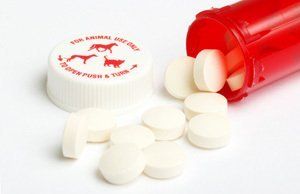Acute Caudal Myopathy (Limber tail)
websitebuilder • May 27, 2019
My 10 year-old Labrador retriever suddenly stopped wagging his tail. It was really droopy, and my veterinarian says he has “limber tail.” What is that?
The term “limber tail” is one of several slang terms that apply to a condition that is technically called acute caudal myopathy. Some of the other terms you might hear that apply to this include:
- Swimmer’s tail
- Cold water tail
- Dead tail
- Broken tail
- Limp tail
- Rudder tail
- Broken wag
Working dogs and active hunting dogs seem to be at greatest risk for developing this condition, but it can happen to any breed -- to any dog with a tail!

Is this a true medical condition?
Yes. Acute caudal myopathy typically results from overuse of the tail, causing trauma to the bony vertebrae of the tail or the surrounding muscles and ligaments. Possible scenarios leading to limber tail include hard/vigorous play within the previous 24 hours, swimming in cold water, or active hunting within the past few days. Your dog may act fine immediately following activity but will wake up in pain the next day. The key risk factors appear to be overexertion and/or exposure to very cold water or cold weather.
Limber Tail — Dog Drinking On The Lake in Clarksville, IN
"The key risk factors appear to be overexertion
and/or exposure to very cold water or cold weather."
How is limber tail diagnosed?
Typically, limber tail is diagnosed by connecting the dots between your dog’s symptoms and recent high activity, in addition to a careful evaluation of your dog’s tail by your veterinarian.
Your dog may have difficulty rising because dogs use their tails for balance. Likewise, your dog may have difficulty finding a comfortable position in which to sit and you may see him shifting his weight from side to side. The tail may droop limply between your dog’s rear legs, as though he is “ashamed.” or it may stick straight out behind him for a short distance before drooping. Your dog may be so distracted by his pain that he might not eat, and he could be reluctant to squat to defecate.
The veterinary examination will include a careful palpation of the tail starting at the base (up by the pelvis) and proceeding down the entire length. The goal is to locate the discomfort and rule out any other problems that might explain the symptoms.
What else can explain these symptoms?
Other medical problems that resemble limber tail include:
- Tail fracture
- Lower back pain from a diseased intervertebral disk or osteoarthritis
- Infection or inflammation of the anal glands
- Prostate disease
The fact that other medical problems can look similar to limber tail reinforces the need for a thorough examination by your veterinarian.
How is limber tail treated?
Uncomplicated acute caudal myopathy is treated with rest and anti-inflammatory medication. There is nothing in the home medicine cabinet that is safe for you to give, so please only use medication that has been prescribed by your veterinarian. Most dogs are back to normal within a few days to a week. Just because your dog developed limber tail once does not mean that it will happen again when he returns to his favorite activities. You do not need to prevent your dog from doing the things that feed his soul!
This client information sheet is based on material written by: Robin Downing, DVM, CVPP, CCRP, DAAPM
© Copyright 2014 LifeLearn Inc. Used and/or modified with permission under license.

Acetazolamide (brand names: Diamox®) is a diuretic and antiglaucoma agent, used primarily to treat glaucoma (increased eye pressure), syringomyelia (cyst that affects nervous system), and metabolic alkalosis. Its use in cats and dogs to treat glaucoma, syringomyelia, or metabolic alkalosis is ' off label ' or ' extra label '. Many drugs are commonly prescribed for off label use in veterinary medicine. In these instances, follow your veterinarian’s directions and cautions very carefully as their directions may be significantly different from those on the label.



